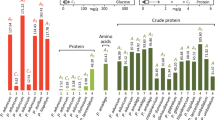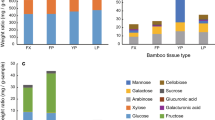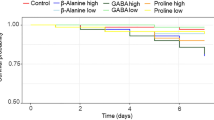Abstract
IT is known that houseflies1 and blowflies2 can be kept alive perfectly well on a diet consisting of cane-sugar and water alone. Addition of protein is only essential for the development of eggs. At a temperature of 26° C., Calliphora erythrocephala on a diet of pure water lives only two to three days, on cane-sugar and water one to two months. If cane-sugar is replaced by other sugars, polysaccharides or polyhydric alcohols, it is found that many substances support adult life equally well. One (sorbitol) is actually much better, others are not so good as cane-sugar; whereas many substances are not utilised at all.
This is a preview of subscription content, access via your institution
Access options
Subscribe to this journal
Receive 51 print issues and online access
$199.00 per year
only $3.90 per issue
Buy this article
- Purchase on Springer Link
- Instant access to full article PDF
Prices may be subject to local taxes which are calculated during checkout
Similar content being viewed by others
References
Glaser, J. Exp. Zool., 38, 383 (1923).
Evans, Butt. Ent. Res., 26, 115 (1935).
Phillips, J. Agric. Res., 35, 385 (1927).
Vogel, Z. vergl. Phys., 14, 273 (1931).
Weidenhagen, Ergeb. Enzymf., 1, 168 (1932).
Author information
Authors and Affiliations
Rights and permissions
About this article
Cite this article
FRAENKEL, G. Utilisation of Sugars and Polyhydric Alcohols by the Adult Blowfly. Nature 137, 237–238 (1936). https://doi.org/10.1038/137237b0
Published:
Issue Date:
DOI: https://doi.org/10.1038/137237b0
Comments
By submitting a comment you agree to abide by our Terms and Community Guidelines. If you find something abusive or that does not comply with our terms or guidelines please flag it as inappropriate.



